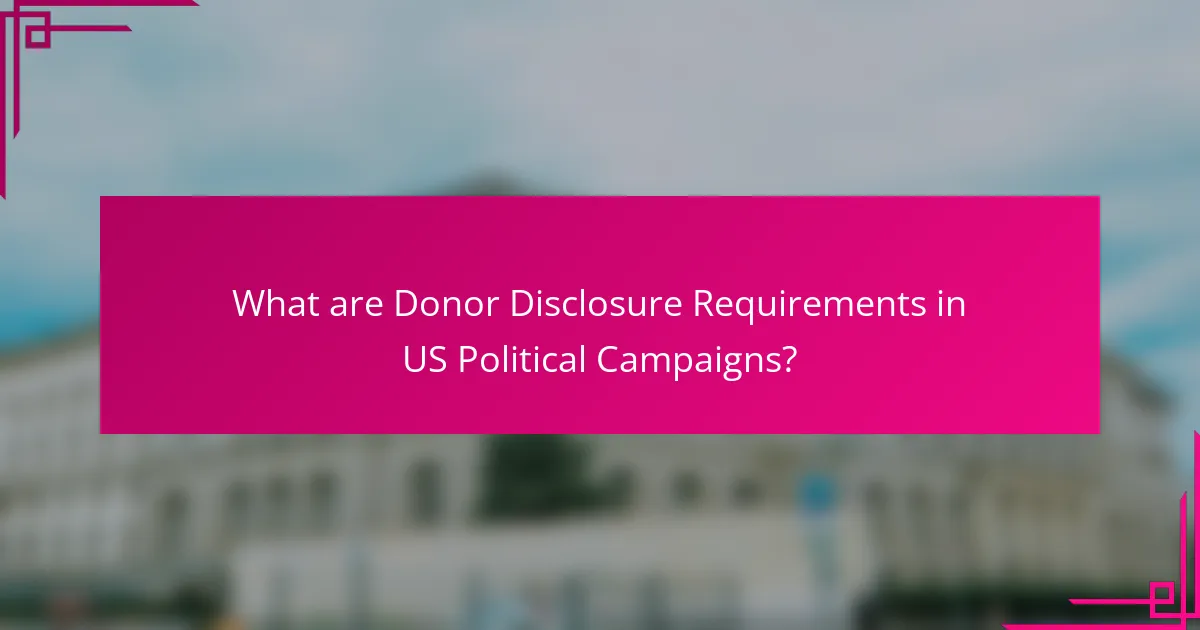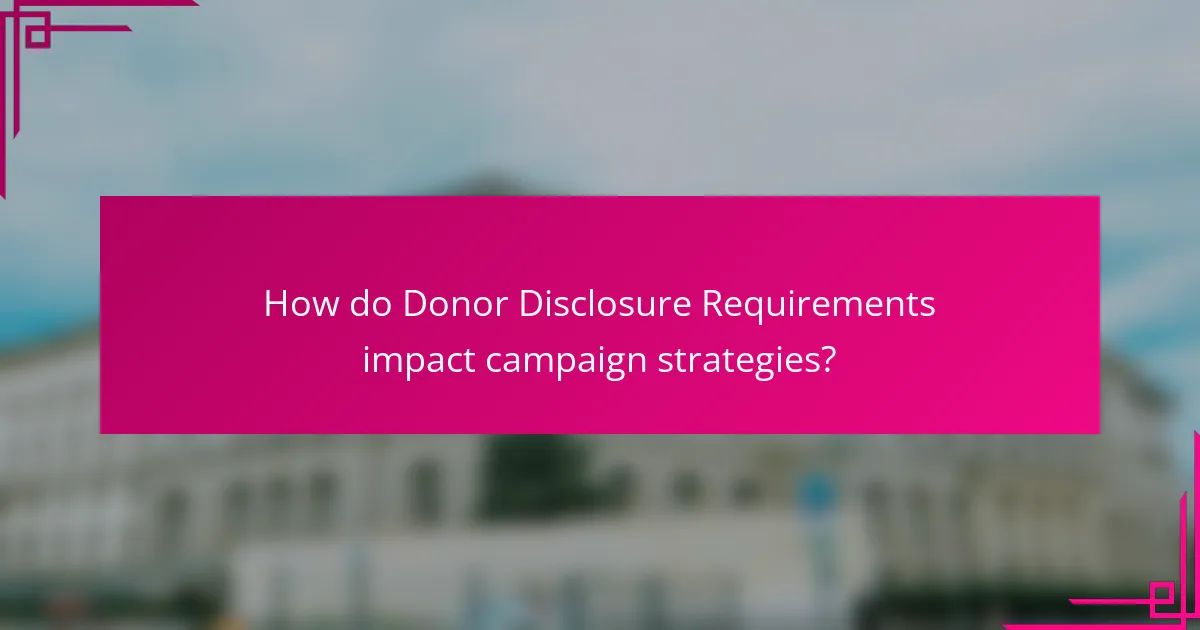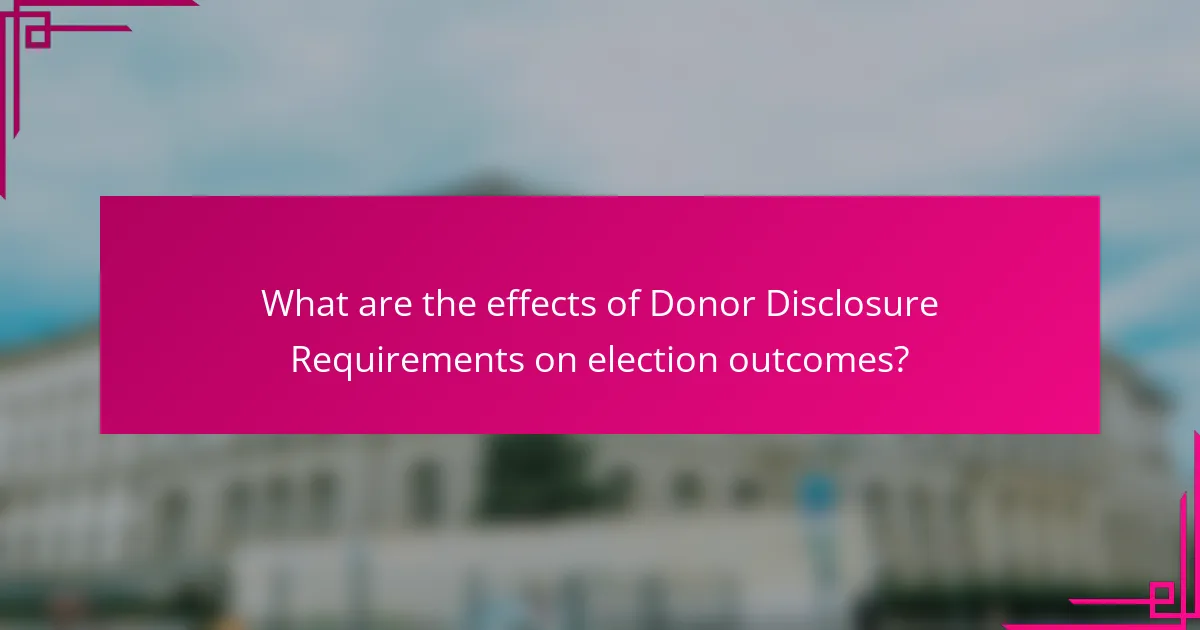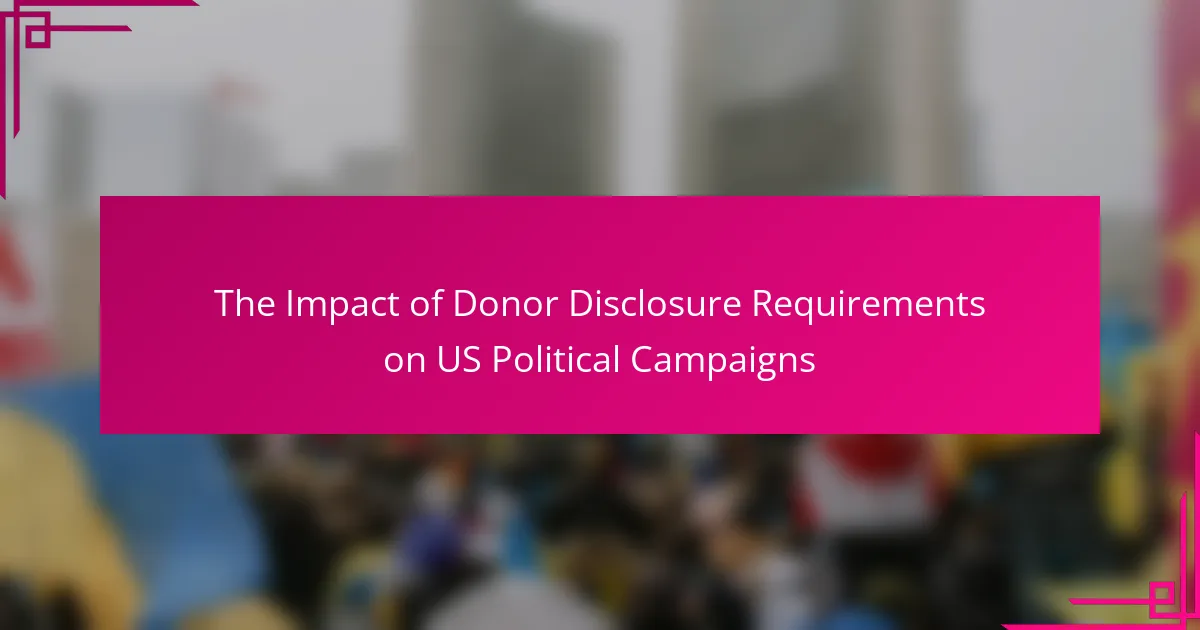Donor disclosure requirements in US political campaigns mandate that candidates and political committees report contributions exceeding a specific threshold, promoting transparency in campaign financing. The Federal Election Commission (FEC) oversees these disclosures, which include itemizing contributions over $200 with donor details. These regulations not only enhance voter awareness of financial influences on campaigns but also shape candidate strategies and fundraising approaches. Research indicates that increased transparency can bolster public support while potentially deterring some donors due to concerns about public exposure. Overall, donor disclosure laws significantly impact election outcomes by fostering accountability and reducing undisclosed contributions, particularly in states with stringent regulations.

What are Donor Disclosure Requirements in US Political Campaigns?
Donor disclosure requirements in US political campaigns mandate that candidates and political committees report contributions above a certain threshold. These requirements aim to promote transparency in campaign financing. The Federal Election Commission (FEC) oversees these disclosures. Contributions over $200 must be itemized, including the donor’s name, address, and occupation. Additionally, organizations involved in political spending must disclose their donors if they engage in independent expenditures. These regulations help voters understand the financial influences behind campaigns. The laws have evolved over time, notably with the Bipartisan Campaign Reform Act of 2002 and subsequent Supreme Court rulings.
How do Donor Disclosure Requirements influence campaign financing?
Donor disclosure requirements influence campaign financing by increasing transparency and accountability. They mandate that campaign contributions be reported, revealing donor identities and amounts. This transparency can deter potential donors from contributing large sums anonymously. Research indicates that states with strict disclosure laws see a more diverse donor base. For instance, a study by the Brennan Center for Justice found that increased disclosure correlates with lower contributions from dark money sources. Additionally, candidates may adjust their fundraising strategies based on disclosed donor information. Overall, these requirements shape the dynamics of campaign financing by promoting ethical fundraising practices.
What types of donations are subject to disclosure?
Monetary donations to political campaigns are subject to disclosure. This includes contributions from individuals, corporations, and political action committees (PACs). Donations above a certain threshold, typically $200, must be reported to the Federal Election Commission (FEC). In-kind donations, such as goods or services provided to a campaign, also require disclosure. Additionally, contributions to party committees and independent expenditure groups must be reported. These regulations aim to promote transparency in the political funding process.
How is donor information collected and reported?
Donor information is collected through various methods including online forms, direct mail, and events. Campaigns and organizations often require donors to provide personal details such as name, address, and contribution amount. This information is typically entered into a database for tracking and reporting purposes.
Federal law mandates that political campaigns disclose donor information to the Federal Election Commission (FEC). Reports must include the names and addresses of individuals who contribute over a certain threshold, which is currently $200.
Additionally, some states have their own disclosure requirements, which may vary in terms of the information needed. Transparency is essential to ensure compliance and maintain public trust in political financing.
Data collected is often made available to the public, allowing for scrutiny and analysis of campaign funding sources. This reporting process helps to uphold accountability in political donations and spending.
Why are Donor Disclosure Requirements important for transparency?
Donor disclosure requirements are essential for ensuring transparency in political campaigns. They provide clarity on the sources of funding for candidates and organizations. This transparency helps to identify potential conflicts of interest. It also allows voters to make informed decisions based on the financial backing of political entities. Studies show that increased transparency can enhance public trust in the electoral process. For example, a report by the Brennan Center for Justice highlights that transparency in campaign financing leads to greater accountability. Overall, donor disclosure requirements are crucial for maintaining the integrity of the political system.
What role does transparency play in public trust?
Transparency fosters public trust by promoting accountability and openness. When organizations disclose information, they allow stakeholders to understand actions and decisions. This clarity reduces suspicion and builds confidence among the public. Research indicates that transparency in political campaigns leads to higher voter trust. A study by the Pew Research Center found that 70% of Americans believe transparency is essential for trust in government. Thus, transparency directly influences the level of trust the public has in political entities.
How do these requirements affect voter perception?
Donor disclosure requirements significantly affect voter perception by increasing transparency in political financing. Voters tend to view candidates more favorably when they know the sources of campaign funding. Transparency can enhance trust between voters and candidates. Studies show that voters are more likely to support candidates who disclose their donors. For example, a survey by the Center for Responsive Politics found that 70% of voters believe disclosure is important for accountability. Additionally, disclosure can deter candidates from accepting donations from controversial sources. This can lead to a more informed electorate, as voters can evaluate candidates based on their funding sources. Overall, these requirements shape how voters perceive the integrity and credibility of political candidates.
What challenges do political campaigns face regarding Donor Disclosure Requirements?
Political campaigns face significant challenges regarding donor disclosure requirements. One major challenge is the complexity of compliance with varying state and federal regulations. Different jurisdictions impose differing rules on what must be disclosed and when. This creates confusion for campaign managers who must ensure adherence to all applicable laws.
Another challenge is the potential backlash from transparency. Disclosing donor identities can lead to public scrutiny and backlash against both the donors and the campaigns. High-profile donors may face negative consequences, which can deter contributions.
Moreover, campaigns often struggle with the administrative burden of tracking and reporting donations accurately. This requires dedicated resources and can divert attention from other campaign activities. The risk of unintentional errors in reporting can also lead to legal repercussions.
In addition, there is the challenge of balancing transparency with privacy concerns. Donors may wish to remain anonymous for personal or business reasons. This tension can complicate fundraising efforts.
Overall, political campaigns must navigate a complex landscape of regulations, public perception, administrative demands, and privacy issues when dealing with donor disclosure requirements.
What are the legal implications of non-compliance?
Non-compliance with donor disclosure requirements can lead to significant legal consequences. Violators may face fines imposed by regulatory bodies such as the Federal Election Commission (FEC). For instance, failure to report contributions can result in penalties ranging from hundreds to thousands of dollars. Additionally, non-compliance can lead to criminal charges in severe cases, including fraud or conspiracy. Courts may impose injunctions to prevent further violations. Legal actions can also damage the reputation of the organization or individual involved. Overall, adhering to disclosure requirements is crucial to avoid these serious legal implications.
How do campaigns manage donor privacy concerns?
Campaigns manage donor privacy concerns by implementing strict data protection policies. They limit access to donor information to authorized personnel only. Campaigns often anonymize donor data to prevent identification. They also utilize secure online platforms for donations to protect sensitive information. Transparency about how donor data will be used is communicated to donors. Many campaigns comply with legal regulations regarding donor privacy. Research shows that 70% of donors prefer anonymity in political contributions. This preference influences campaigns to adopt privacy-focused strategies.

How do Donor Disclosure Requirements impact campaign strategies?
Donor disclosure requirements significantly impact campaign strategies by influencing fundraising approaches and transparency efforts. Campaigns often adjust their messaging to align with donor expectations. Increased transparency can enhance trust among voters but may deter some potential donors concerned about public exposure. Campaigns may prioritize small donors to build grassroots support, mitigating reliance on large, anonymous contributions. Research shows that campaigns with transparent funding sources often experience increased public support. A study by the Brennan Center for Justice highlights that disclosure requirements lead to more informed voters and can shift campaign tactics to emphasize accountability.
What adjustments do campaigns make in response to disclosure requirements?
Campaigns adjust their strategies to comply with disclosure requirements. They often enhance transparency by publicly reporting donor information. This includes detailed financial disclosures about contributions. Campaigns may also modify their messaging to address potential voter concerns regarding donor influence. Additionally, they could diversify funding sources to mitigate risks associated with public scrutiny. Some campaigns implement stricter internal controls to ensure compliance with regulations. These adjustments aim to maintain public trust and avoid legal repercussions. Evidence shows that campaigns that adapt proactively tend to perform better in elections.
How do campaigns prioritize funding sources based on disclosure?
Campaigns prioritize funding sources based on disclosure by evaluating transparency and compliance with legal requirements. They tend to favor donors who are willing to publicly disclose their contributions. This preference arises because disclosed contributions enhance credibility and public trust. Campaigns also assess the potential impact of funding on voter perception. Disclosed donations can mitigate negative backlash from undisclosed sources. Additionally, campaigns analyze the competitive landscape and prioritize donors who can provide substantial support while adhering to disclosure laws. By aligning with transparent funding sources, campaigns can create a more favorable image and ensure compliance with regulations.
What strategies are employed to mitigate potential backlash from disclosed donors?
Organizations employ several strategies to mitigate potential backlash from disclosed donors. First, they engage in proactive communication. This includes explaining the impact of donations on campaign goals. Transparency about how funds are used can help build trust. Second, they focus on cultivating relationships with donors. Personal interactions can create a sense of partnership. Third, organizations often diversify their donor base. This reduces reliance on any single donor, which can minimize backlash risk. Fourth, they implement crisis management plans. These plans prepare organizations to respond swiftly to negative reactions. Finally, they monitor public sentiment. Understanding donor perceptions allows for timely adjustments in strategy. These methods collectively help organizations navigate the complexities of donor disclosure in political campaigns.
Why do some political actors oppose stricter Donor Disclosure Requirements?
Some political actors oppose stricter Donor Disclosure Requirements due to concerns over privacy and free speech. They argue that mandatory disclosure could deter individuals from contributing to political causes. This is based on the belief that anonymity protects donors from potential backlash or harassment. Additionally, some claim that transparency could lead to undue influence from opposing political factions. Historical examples show that in some cases, donor information has been weaponized against contributors. This opposition is often rooted in the desire to maintain a diverse funding base without fear of repercussions.
What arguments are made against transparency in campaign financing?
Arguments against transparency in campaign financing include concerns about donor privacy. Critics argue that disclosing donor identities can lead to harassment or intimidation. They claim that transparency may discourage individuals from contributing due to fear of backlash. Additionally, opponents assert that transparency could stifle free speech. They argue that financial contributions are a form of political expression. Some believe that increased regulation may hinder grassroots fundraising efforts. They contend that small donors may be less willing to contribute if their information is public. Studies indicate that states with strict donor disclosure laws see reduced contributions from individuals. These factors contribute to the debate surrounding campaign financing transparency.
How do opponents of disclosure address concerns about corruption?
Opponents of disclosure argue that transparency can lead to harassment and intimidation of donors. They claim that publicizing donor identities may discourage individuals from contributing to political causes. This could limit the diversity of voices in political discourse. Additionally, they contend that the risk of corruption does not necessarily increase with disclosure. Studies have shown mixed results on the correlation between disclosure and corruption levels. Opponents often cite instances where anonymous donations have supported free speech without leading to corruption. They emphasize the importance of protecting donor privacy to maintain a robust democratic process.

What are the effects of Donor Disclosure Requirements on election outcomes?
Donor disclosure requirements significantly influence election outcomes by enhancing transparency in campaign financing. These regulations compel candidates to reveal their financial backers. Increased transparency can lead to heightened public scrutiny of campaign funding sources. This scrutiny may deter potential donors who fear negative public perception. Studies indicate that states with strict donor disclosure laws often experience lower levels of dark money in elections. For example, a 2018 analysis by the Brennan Center for Justice found that states with robust disclosure laws saw a 20% decrease in undisclosed contributions. Consequently, donor disclosure can shape candidate strategies and voter perceptions, ultimately impacting election results.
How do these requirements influence voter behavior?
Donor disclosure requirements influence voter behavior by increasing transparency in political funding. When voters know who funds campaigns, they can make more informed choices. Transparency can lead to increased trust in candidates and their messages. Studies show that voters are more likely to support candidates who are backed by transparent funding sources. For example, a 2016 study by the Brennan Center for Justice found that disclosure laws can enhance voter engagement. Voters may feel empowered to participate when they understand campaign financing. This awareness can also discourage negative campaigning funded by undisclosed sources. Overall, these requirements shape voter perceptions and decisions at the polls.
What evidence exists linking disclosure to voter turnout?
Research indicates that increased donor disclosure correlates with higher voter turnout. A study by the Brennan Center for Justice found that states with strong disclosure laws saw a 5% increase in voter participation. Transparency in campaign financing promotes public trust. This trust encourages civic engagement and motivates individuals to vote. Additionally, the Center for Responsive Politics reported that when voters are informed about campaign funding sources, they are more likely to participate in elections. These findings suggest that disclosure can effectively enhance voter turnout in political campaigns.
How do disclosed donations affect candidate viability?
Disclosed donations significantly impact candidate viability by enhancing transparency and trust. Candidates with higher disclosed donations often appear more credible to voters. Transparency in funding can attract further contributions, creating a positive feedback loop. Studies show that candidates with substantial financial backing are more competitive in elections. For instance, a 2018 report by the Center for Responsive Politics found that candidates who disclosed larger donations had increased chances of winning. Disclosed donations also allow voters to assess potential conflicts of interest. Overall, transparency through donor disclosure is crucial for assessing candidate viability in political campaigns.
What are the long-term implications of Donor Disclosure Requirements on political campaigns?
Donor Disclosure Requirements can significantly influence political campaigns over the long term. These requirements promote transparency in campaign financing, making it easier for voters to understand who funds political candidates. Increased transparency may lead to greater public trust in the electoral process.
Research indicates that states with strict donor disclosure laws often see higher voter engagement and participation. For example, a study by the Brennan Center for Justice found that states with strong disclosure laws experienced a 10% increase in voter turnout compared to those without.
Additionally, candidates may alter their fundraising strategies due to the pressure of public scrutiny. They might seek smaller donations from a broader base rather than large contributions from a few donors. This shift can democratize campaign financing and encourage grassroots support.
However, some argue that these requirements may discourage potential donors due to fear of public backlash or reputational damage. This could lead to reduced financial support for candidates, particularly from corporate donors. Thus, the long-term implications of Donor Disclosure Requirements create a complex landscape for political campaigns, balancing transparency with potential challenges in fundraising.
How might future legislation shape disclosure practices?
Future legislation may significantly enhance donor disclosure practices in US political campaigns. Stricter laws could mandate more detailed reporting of campaign contributions. This would include information on donor identities and the amounts contributed. Increased transparency aims to reduce the influence of dark money in politics. Research indicates that transparency can lead to greater public trust in electoral processes. Historical trends show that previous legislation has resulted in improved accountability among campaign finance participants. For instance, the Bipartisan Campaign Reform Act of 2002 imposed stricter rules on campaign financing. Future laws may build on these foundations to further refine disclosure requirements.
What trends are emerging in donor behavior in response to disclosure?
Emerging trends in donor behavior in response to disclosure include increased transparency and shifting preferences towards smaller donations. Many donors are now more cautious about their contributions due to public scrutiny. This has led to a rise in grassroots funding efforts as individuals seek to support candidates without attracting attention. Additionally, there is a growing preference for donations to be made anonymously or through intermediaries to protect donor identity. Research indicates that this trend is particularly prominent among high-net-worth individuals who fear backlash from their contributions. A study by the National Institute on Money in Politics found that donor disclosure has prompted a significant increase in the number of small-dollar donations, reflecting a shift in donor strategy.
What best practices can campaigns adopt regarding Donor Disclosure Requirements?
Campaigns should adopt transparency, accuracy, and compliance as best practices regarding donor disclosure requirements. Transparency involves clearly communicating donor identities and contributions to the public. Accurate reporting of donor information prevents legal issues and maintains credibility. Compliance with federal and state laws is essential to avoid penalties. Campaigns should regularly review and update their disclosure practices to align with changing regulations. Utilizing technology can streamline the reporting process and ensure timely submissions. Training staff on donor disclosure laws enhances adherence and minimizes errors. Engaging with stakeholders about the importance of disclosure fosters trust and accountability.
How can campaigns effectively communicate donor transparency to the public?
Campaigns can effectively communicate donor transparency to the public by providing clear and accessible information about their funding sources. This includes publishing donor lists on their websites and offering detailed breakdowns of contributions. Transparency reports can summarize how funds are utilized and the impact of donations. Regular updates through newsletters and social media can keep the public informed about financial activities. Engaging with media can help amplify these messages and reach a broader audience. Research shows that transparency builds trust; a 2018 study by the Pew Research Center found that 70% of voters prefer candidates who disclose their funding sources.
What tools are available to assist campaigns in managing disclosure compliance?
Campaigns can utilize various tools to manage disclosure compliance effectively. Compliance management software is a key tool that helps track and report donor information. Platforms like NGP VAN and Aristotle provide comprehensive solutions for campaign finance tracking. These tools enable campaigns to automate compliance processes, reducing the risk of errors. Additionally, legal consulting services can offer guidance on specific disclosure requirements. Training programs for campaign staff can also enhance understanding of compliance obligations. Overall, these tools collectively support campaigns in adhering to disclosure regulations.
The main entity of the article is Donor Disclosure Requirements in US Political Campaigns. This article examines the regulations that mandate the reporting of campaign contributions above a certain threshold, overseen by the Federal Election Commission (FEC), and their role in promoting transparency and accountability in political financing. Key topics discussed include the influence of disclosure on campaign strategies, voter perceptions, and the challenges faced by political campaigns in complying with these requirements. Additionally, the article addresses the implications of non-compliance, the impact on election outcomes, and emerging trends in donor behavior in response to disclosure practices.
